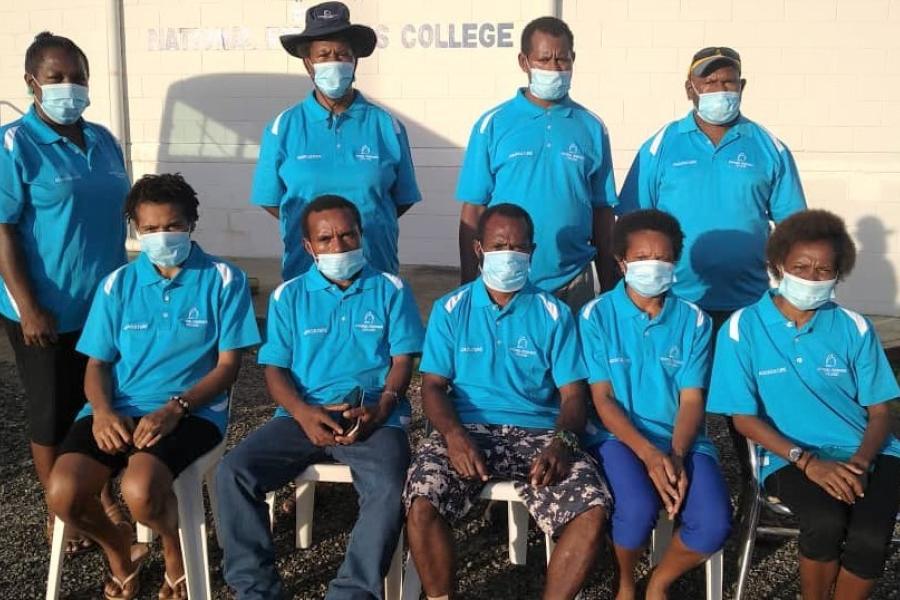FAO under EU-STREIT PNG partners National Fisheries Authority to upskill government fisheries officers
13 July 2021
EU-STREIT PNG supports the country to enhance further its capacity to offer quality extension services to local fisheries-dependent communities.

Caption: The participants are from 10 districts of East and West Sepik provinces who commenced Certificate One Aquaculture training course which is on-going, while four will attend the Certificate Two Small Fishing Operations (SFO) training course to start in August 2021.
Photo: © UN FAO PNG
Wewak, ESP – The FAO-Led EU-STREIT Programme in Papua New Guinea enters into a partnership with the PNG’s National Fisheries Authority to upskill country’s fisheries officers.
Under a Letter of Agreement (LoA) signed between Managing Director of National Fisheries Authority (NFA) Mr John Kasu and the FAO Country Head of Office, Mr Ken Shimizu, EU-STREIT PNG offers its support to upscale the knowledge and skills of 14 government fisheries officers through a 10-week training at the National Fisheries College (NFC) in Kavieng.
Ten of these officers have already commenced Certificate One Aquaculture training course which is on-going, while four will attend the Certificate Two Small Fishing Operations (SFO) training course to start in August 2021. The participants are from 10 districts of East and West Sepik provinces.
The major outputs of this collaboration are to build the capacity of officers in fisheries operations and aquaculture, enabling them to design and conduct training workshops and facilitate capacity building for fishery and aquaculture entrepreneurs. The initiative also equips the officers with understanding and skills to adopt appropriate extension tools, methods and techniques to conduct advisory and extension services to target beneficiaries.
The attendees also will receive training on how to sustain and enhance their technical capacity through continuous self-learning, knowledge resources available online and peer-to-peer knowledge transfer.
“These officers will return to their respective areas and will be able to service better our rural farmers to improve the quality of fish products for an increase in income to sustain their wellbeing, and also to enhance food security and nutrition at the household level,” explains Mr Francisco Noble, EU-STREIT PNG International Fisheries Specialist.
Two participants under this support are Junnel Yendo, 27, and Philemon Maino, 32, both from Yangoru-Saussia District, East Sepik Province. “So far the training is very helpful and I’m learning a lot. After completing my training, I will be able to impart these skills and knowledge to the farmers” says Mr Maino. “One main problem face by our farmers is the lack of technical know-how in fish farming, thus, after completing this training I can be able to impart to my farmers the skills and knowledge to help my farmers improve their fish husbandry,” adds Ms Yendo.
Fish has nutritious value in terms of protein supplement to rural communities and is one of three value chains with cocoa and vanilla supported under this European Union-funded Programme.
The focus of EU-STREIT PNG under this component is on inshore & riverine fishing and aquaculture. This intervention aims to serve a dual diversification enterprise development as well as ensuring food security and nutrition. To achieve these goals, the Programme trains the local fishers and works on increasing fishing efficiency and returns, establishing fisheries cold chains, setting up hatcheries, improving feeding management and promoting fisher marketing collectives (in particular women’s groups).
The EU-STREIT PNG, being implemented as a UN joint Programme (FAO as leading agency, and ILO, ITU, UNCDF and UNDP as implementing partners), is the largest grant-funded Programme of the European Union in the country and the Pacific region, which focuses on increasing sustainable and inclusive economic development of rural areas through Increasing the economic returns and opportunities from cocoa, vanilla and fishery value chains and strengthening and improving the efficiency of value chain enablers including the business environment and supporting sustainable, climate-proof transport and energy infrastructure development. |



